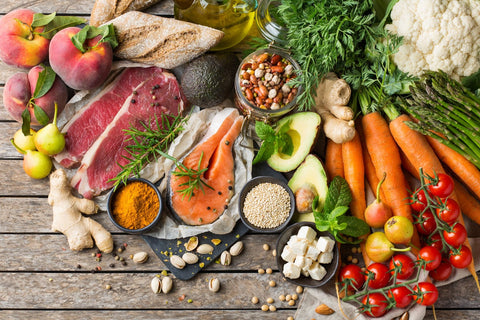Good health is a state of complete physical, mental, and social well-being, where your body functions optimally, allowing you to lead a vibrant and fulfilling life.
Metabolic flexibility plays a crucial role in this, referring to your body's ability to efficiently and quickly switch between burning different fuel sources, such as fats and carbohydrates, based on how metabolically flexible you are. This flexibility is key to maintaining energy levels, managing weight, and reducing the risk of metabolic diseases and literally, the quality of your life.
However, the over consumption of processed foods will completely halt the benefits of metabolic flexibility and overall health all due to the high levels of added sugars, unhealthy fats, and artificial additives.
These processed food ingredients disrupt blood sugar levels, contribute to weight gain, and lead to a host of health issues, underscoring the importance of limiting processed foods in favor of a more natural, nutrient-rich diet.
In this blog, we’re discussing these components in even more detail. Keep reading to learn everything you need to know.
Defining Good Health
What is good health? And how would you define it? If you were sick with the flu, you might define good health as not being sick anymore.
Medically speaking, “acute” means temporary, sudden, and usually a more serious health risk than the flu. An example would be a broken bone.
On the other hand, “chronic” means longer lasting. It generally takes several months or years for a chronic condition to develop. Type II diabetes is a chronic health condition.
True Health Insurance
My philosophy is to focus on treating or managing. And, when I say “managing,” I mean avoiding or getting rid of any chronic health condition. Here’s my logic. If I am resistant to chronic issues, then the odds of getting any acute issue is going to be greatly minimized or avoided altogether. If I do get an acute condition like a cold or flu, I’m able to recover from it quickly, all because I’m metabolically flexible.
Metabolic Flexibility
One of the benefits of being metabolically flexible is your body’s ability to repel chronic health conditions. Focusing on your health allows you to become metabolically flexible, which is the pinnacle of health. I have such an aversion to chronic issues because I know what a scary monster they are and so do you - issues like heart disease, cognitive decline, obesity, diabetes and the list is long. The good news is metabolic flexibility chases them all away.
Carrying Luggage at 80
Anything that prevents me from doing the things I did when I was young is enemy number one. I define good health as being able to do the activities that I want to do.
For example, I want to be able to carry my own luggage around as I tour through Europe. I want to be able to lift my two-year-old grandchild up over my head and get off the floor without anyone helping me up when I’m 80+ years old. To be able to do those things, I need to prepare for it now!
10% Surviving Your First “Cardiac Arrest”
I am going to guess that it is seldom — if ever — that you have thought about those two words, and I understand. I’m asking you to start thinking about it in the same way you think about your health, auto, and life insurance policies.
Isn’t it true that you don’t think about insurance until you need it? If you don’t have any coverage when you do need it, it's too late to buy it. In other words, focusing on your health when you are lying in a hospital bed after a cardiac arrest is a bit too late.
Your focus on health is your health insurance. By the way — only about 10% survive their first cardiac arrest. Focusing on a lifestyle designed to prevent chronic health issues is better than any insurance policy. And the #1 most important place to start is your food.
Make a Plan - And Then Eat It
Meal planning and preparation is a great place to start. Food must taste good or you're not going to eat it. That goes without saying, regardless of whether it's healthy for you.
I’m going to divide your food into two categories: food you make at home and food you eat away from home; home delivery falls into the second category. The first thing you need to do is stay away from processed foods as much as you can. What is processed food? Any food that has been altered in some way during preparation, like the foods pictured below.
Why Avoid Processed Food?
If you pick an apple from a tree and wash it, it has been processed. If you cut it into slices, that’s even more processing. Truthfully, the nutritional quality of that apple would not be diminished at all, with this minimal level of processing.
My point?
You want to minimize as much manipulation of the food as possible from when you plucked it from the tree, pulled it from the ground, or snatched it off the farm.
Food is Data
The second point is that after you eat food, your body literally sees it as data like a program code is instructions for a computer. Your body responds to the data you ate with chemicals and electronic signaling; your body doesn’t know the difference between an apple and a porcupine. It can only see the data that the food is giving.
Process Rules
The first rule to processed foods is that the more you alter it from its natural origin, the more your body sees it as being different data from the original. And being different means that the digestive process will be different.
Here’s a good example. Apple juice is natural — right or wrong? When was the last time you saw a spigot on the trunk of an apple tree, waiting for you to pull the lever and pour that 100% all-natural juice into your glass? All juice is processed — some brands much more than others, and I recommend avoiding it completely.
Eating is Better Than Drinking
First tip — it’s best to eat your fruit instead of drinking it. Always eat your fruit instead. Let’s assume that the juice has no artificial ingredients added, like colors, preservatives, etc. Let’s also assume that no “added” ingredients have been added, like sugar.
While this is better than ultra-processed fruit juice, I still don’t recommend drinking it.
Even if you grow your own apples, never use any chemicals in the care of your tree, and wash your hands, it’s still best to eat fruit instead of drinking fruit juice. It’s a healthier choice, because your body digests processed food differently than whole foods.
It Matters if You Drink it vs. Eat it
Eating the whole fruit vs. drinking it will result in a completely different response from your body. The juice will greatly increase how high your glucose levels go up compared to eating an apple. It will greatly increase your insulin response, in comparison. Since almost half of Americans are insulin-resistant, that’s a big deal.
I won’t mention the hundreds of other chemical and electrical processes your body goes through in the digestion process.
What Does Processed Food Look Like?
What about applesauce? It’s true that it is processed less than juice but it is only a small measure better. Instead of giving an infant juice in their bottle or feeding them apple sauce, I recommend waiting until they are old enough to handle small pieces or until they can eat whole slices.
Back to meal planning. Making a plan is always a smart choice because you have time to prepare your meals and eliminate as many processed ingredients and foods as possible. Do I eat processed foods? Yes. But I pick foods that are processed as little as possible. And I supplement with nutrients to fill in the gaps that the processing took out. And I don't eat processed foods often.
Can’t Put The Genie Back Into The Bottle
For example, I like to supplement with both soluble and insoluble fibers because fiber is usually the first essential ingredient that is removed from processing. Vitamins and minerals are often reduced, if not completely eliminated through processing.
When you see the word “fortified,” that means that elements have been removed because of processing and then added back in, to boost the nutritional value of the food.
Is the fortification as good as the version Mother Nature put in there? The short answer is not in most cases. Let me explain. As a food manufacturer, WiO purchases vitamins and minerals to fortify our foods. I have two categories to pick from: synthetic or all-natural. These two categories are as different as night and day!
Natural – 100% All-Natural – Synthetic
How can something that is synthetic be called natural? Mercury, cyanide, and petroleum oil, for example, can be found in the ground and water. It was there before mankind ever took our first breath; it “naturally” occurs. But it isn’t healthy and downright deadly.
Merely because it’s natural doesn’t mean that it’s safe and healthy to consume. For the same reason – don’t put your head inside the mouth of your pet lion… nature can bite back!
If a food company can purchase healthy, 100% all-natural versions of supplements, why does a company pick synthetics? Lower cost and flavor are the short answer. I can buy a synthetic vitamin for 10-20 times cheaper than from whole-food-sourced ingredients.
And as a formulator, it is much easier to make the food taste good when using a synthetic. One reason is the amount you need to fortify the food. Because it is synthetic, it can be concentrated so much that I am able to use 20-100 times less. If less is used, it is much harder for you to taste its presence.
Without getting into the weeds, I think we know our bodies see a synthetic differently than a whole food, and synthetics are absorbed at a much lower rate. This is the reason that I only formulate our products with whole food sourced supplements and never use the synthetic version. It costs more, but it’s well worth it.
Quick Summary –
- Plan your meals ahead of time
- Read the label and look for whole-food-sourced ingredients; skip the synthetics
- Reduce the frequency and amount of processed foods you eat
- Keep your head out of the lion’s mouth
WiO SmartFoods
Ready to embrace a lifestyle of vitality and taste without compromising on health? Dive into the world of WiO SmartFoods, where we're committed to bringing you delicious, minimally processed food options that are as good for your body as they are for your taste buds.
Make the smart choice today and transform your eating habits with WiO SmartFoods — because you deserve food that's both healthy and irresistibly tasty. Explore WiO SmartFoods now, and embark on a journey to optimal health with every bite!






